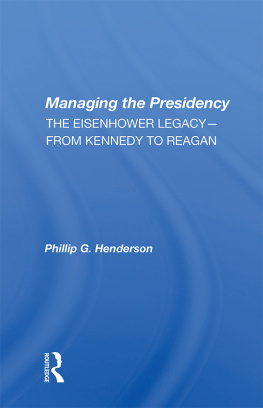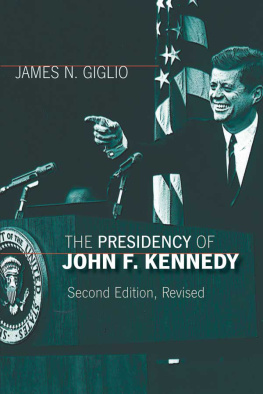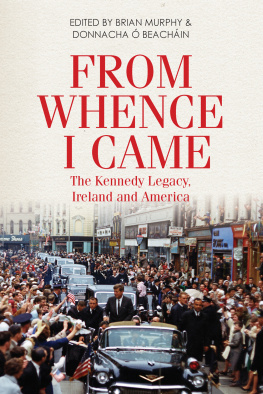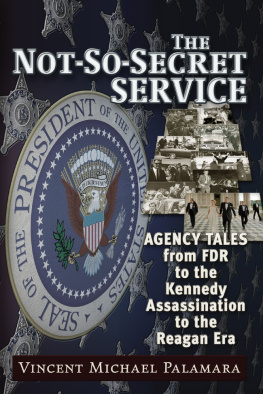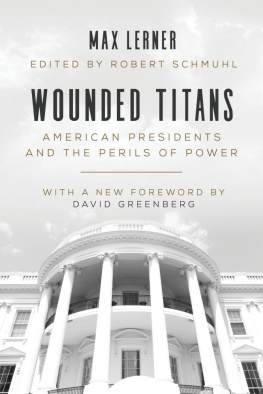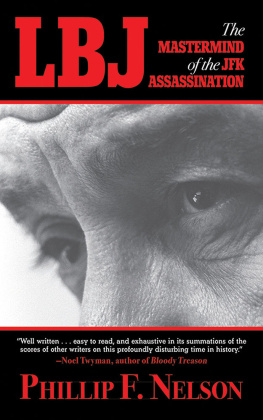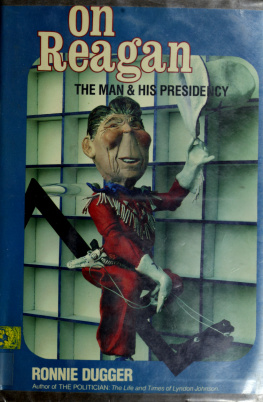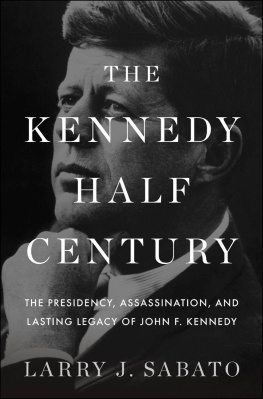Managing the Presidency
Transforming American Politics Series
Lawrence C. Dodd, Series Editor
Dramatic changes in political institutions and behavior over the past two decades have underscored the dynamic nature of American politics, confronting political scientists with a new and pressing intellectual agenda.
Transforming American Politics is dedicated to documenting these changes, reinterpreting conventional wisdoms, tracing historical patterns of change, and asserting new theories to clarify the direction of contemporary politics.
Titles in This Series
Managing the Presidency: The Eisenhower Legacy From Kennedy to Reagan, Phillip G. Henderson
Remaking American Politics, edited by Richard A. Harris and Sidney M. Milkis
Democracies in Crisis: Public Policy Responses to the Great Depression, Kim Quaile Hill
The Congress, the President, and Public Policy: A Critical Analysis, Michael Mezey
Managing the Presidency
The Eisenhower Legacy from Kennedy to Reagan
Phillip G. Henderson
First published 1988 by Westview Press, Inc.
Published 2018 by Routledge
52 Vanderbilt Avenue, New York, NY 10017
2 Park Square, Milton Park, Abingdon, Oxon OX14 4RN
Routledge is an imprint of the Taylor & Francis Group, an informa business
Copyright 1988 Taylor & Francis
All rights reserved. No part of this book may be reprinted or reproduced or utilised in any form or by any electronic, mechanical, or other means, now known or hereafter invented, including phtocopying and recording, or in any information storage or retrieval system, without permission in writing from the publishers.
Notice:
Product or corporate names may be trademarks or registered trademarks, and are used only for identification and explanation without intent to infringe.
Library of Congress Cataloging-in-Publication Data
Henderson, Philip G.
Managing the presidency.
(Transforming American politics)
Bibliography: p.
Includes index.
1. PresidentsUnited StatesStaff. 2. United
StatesExecutive departmentsManagement. 3. United
StatesPolitics and government1953-1961. 4. United
StatesPolitics and government1981- . 5. Iran
Contra Affair, 1985- . I. Title. II. Series.
JK518.H43 1988 353.03'1 87-31716
ISBN 13: 978-0-367-00680-8 (hbk)
TO my wife, Mary Lou, my father, Paul Glen Henderson, Sr., and the memory of my mother, Beatrice "Dolly" Henderson (January 15, 1920, to March 27, 1987)
My interest in the organization and management of the Presidency was kindled nearly a decade ago in my first seminar as a graduate student in political science at the University of Michigan. Under Professor George Grassmuck's able guidance, the seminar served as a useful sounding board for many of the ideas discussed in this book.
Research for the book began in earnest when I visited the Eisenhower Library in Abilene, Kansas, during the summer of 1981. The recently declassified materials of the Ann Whitman File of the Eisenhower Library confirmed my expectation that an entire book on Eisenhower's management of the Presidency was well warranted. But I decided early on that the Eisenhower legacy could not be treated in a vacuum. Indeed, the richness of Eisenhower's contributions to the organization and management of the Presidency can best be understood if one views them in the context of how his successors have fared as administrators. Hence, substantial portions of this study are devoted to appraisals of the approaches of Eisenhower's successors in managing the Presidency.
The recent Iran-Contra debacle of the Reagan administration warrants special attention in this study because of the stark contrast it provides with the orderly and methodical advisory and decision-making processes of the Eisenhower years. Whereas Eisenhower's Presidency offers remarkably fresh insights on how to improve the organization and management of the Presidency, the recent experience of the Reagan administration is rich in lessons on what to avoid in presidential policy-making. In this book I shall discuss both the successes and the failures of presidential management on the premise that much can be learned from both.
In completing this book I received wise counsel and assistance from several individuals. The staff of the Eisenhower Library was exceptionally helpful throughout my extended research visit in 1981. I was impressed with the high level of professionalism and unfailing courtesy of the entire staff. In particular, I wish to thank archivists David Haight and Rob Soubers, who pointed me to many useful collections of documents concerning Eisenhower's use of the Cabinet, National Security Council, and White House staff.
I am indebted to several individuals at the University of Michigan for their helpful insights and advice. George Grassmuck was instrumental in sparking my interest in the topic of presidential management; he also provided expert guidance on all but one of the chapters of the book. Harold Jacobson stimulated my thinking on several of the major issues addressed in this study regarding the organization and conduct of American foreign policy. I gratefully acknowledge Gerald Linderman's thoughtful and perceptive comments on the manuscript. His perspective as an historian and his meticulous comments helped refine and improve the final product in many ways. His kind encouragement throughout the course of the project and his expert advice are greatly appreciated. Jack Schroeder has had a major influence on my writing since my days as an undergraduate student in his courses on American government. More than any other person he shaped my interest in political science. His comments on the manuscript were typically incisive and useful.
In addition, I wish to thank Dr. R. Gordon Hoxie, the Director of the Center for the Study of the Presidency, for granting me the permission to use material from an essay that I contributed to his volume, The Presidency and National Security Policy (copyright 1984, by the Center for the Study of the Presidency in New York). Dr. Hoxie has made a major contribution to revisionist scholarship on the Eisenhower Presidency and to the literature on White House organization. His expansive knowledge of the Presidency has been very helpful, as has his support of my work.
I also wish to thank two members of the Eisenhower administration, General Andrew Goodpaster and Bradley Patterson, for graciously granting illuminating interviews on the Eisenhower Presidency. Their insights form an important part of this work.
My thanks also go to Dennis Muniak, Lou Cantori, John Streby, Jim Miclot, and Ray Taras for commenting on various chapters in the manuscript. All provided insights that served to strengthen the final product.
Finally, I would like to note that my wife, Mary Lou, was truly an inspiration throughout this project. She listened patiently to my ideas, provided meaningful comments on many portions of the work, shared in the burden of typing the text, and quietly tolerated my weekend writing and my soap opera-like addiction to the televised Iran-Contra hearings. For all of this, I am very grateful.
For errors of omission, accuracy, interpretation, or content, the buck stops with me.
Phillip G. Henderson
The Iran-Contra affair has called into question more than just the structure of decision-making processes in the Reagan administration. It has brought to the fore the larger question of how to manage the Presidencya question of ever-growing complexity in the postwar era. Not since the Bay of Pigs fiasco of the Kennedy years has so much attention been focused on the need for well organized and highly disciplined advisory and decision-making processes in the conduct of foreign policy. The Tower Commission, after an exhaustive investigation, concluded that the Reagan administration's decision to sell arms to Iran and the ensuing National Security Council staff support of the Contras of Nicaragua illustrate "the perils of policy pursued outside the constraints of orderly process." In testimony before Congress, former National Security Advisor Robert McFarlane added: "In the six months since the Iran-Contra controversy erupted, many people have come to believe there is something wrong with the way this country makes foreign policy. They probably don't know how wrong."


